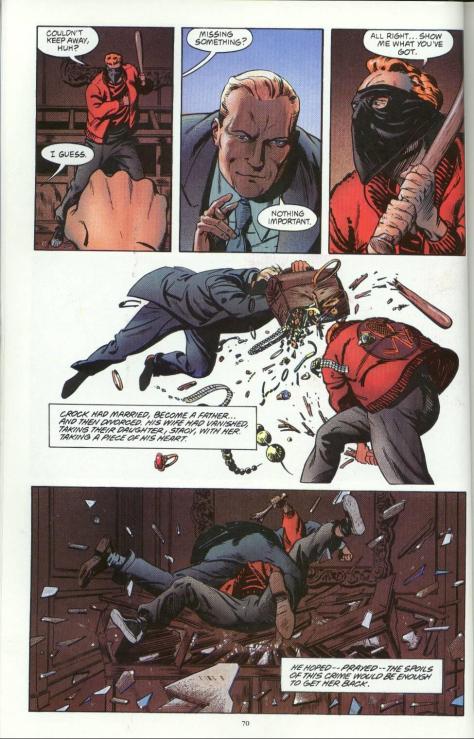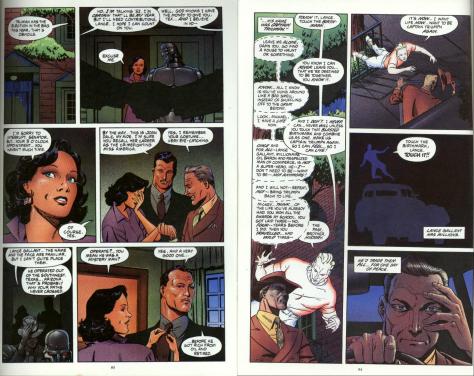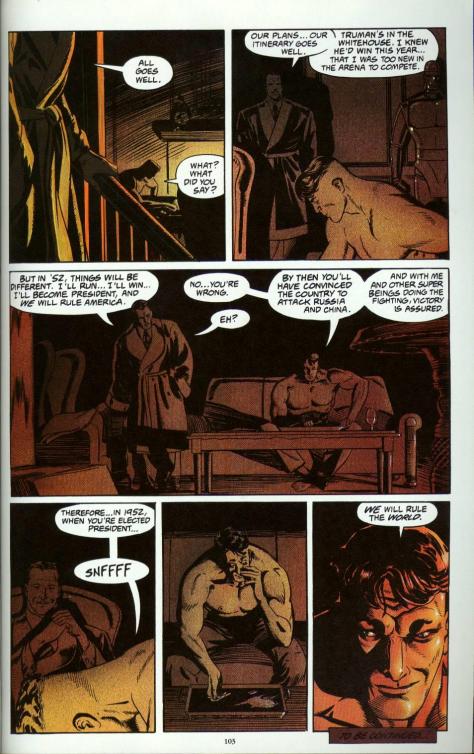Hello, Unspoken, and happy holidays! Many of you are probably reading this as you look forward to a relaxing few days of food and fun with your families….haha, yeah right. It’s far more likely you are scoping this out as you curse whatever airline has delayed your travels or are hiding from some drunk, overbearing relative, so I hope this article provides a welcome respite from whatever familial hell you find yourself in. Grab some pumpkin pie, liberally douse in Cool Whip, try not to fall into a food coma, and enjoy Hex for the Holidays!
Even though I am still relatively new to actually reading comic books, I have acquired a lot of peripheral knowledge about a myriad of characters over the years from friends, but before reading the subject of this article, I knew only two things about Jonah Hex:
1. He is a Western character.
2. They made a movie about him starring Megan Fox, and everyone hated it.
That’s it. Trying to get a better sense of what I was about to read based on the cover didn’t help much either. I ended up assuming he must be some sort of demon or undead creature in the vein of Ghost Rider.

Imagine my disappointment, then, when I started the comic, 1993’s Jonah Hex: Two-Gun Mojo, and realized that Jonah Hex was just a guy without any sort of powers, demonic or otherwise. The Western is far from my favorite genre, so when I was introduced to Hex while he is in the middle of being strung up by outlaws and no lasers came out of his glowing eye, I settled in for what I imagined would be pretty rote five issues of saloon shootouts, horses being hitched, and people saying things are “mighty fine.” (Of course, anyone who knows anything about Jonah Hex would find this to be a silly and unnecessary thing to be disappointed by, but we’ll get to that.)
Hex, of course, gets rescued because it would be a very short story if he didn’t. His savior is a fellow bounty hunter by the name of Slow Go Smith, who was tracking the gang attempting to make my read a quick one. Slow Go could have very easily devolved into an insanely cliched Old West character, but as soon as he cuts the heads off the gang to collect his bounty rather than transport the bodies, I was won over. (What can I say, I’m a girl of simple tastes.)

Even when I was unfairly convinced this would just be a tale of a grizzled ol’ timey lone gun, I took solace in the fact that it was a gorgeously drawn tale of a grizzled ol’ timey lone gun. Every panel, no matter how gruesome the content, is beautiful to look at and seems rendered with the utmost care. The colors are simultaneously rich and slightly faded, like they’ve been left out in the hot desert sun. All credit where it’s due to the artists (pencils by Timothy Truman, ink by Sam Glanzman, and colors by Sam Parsons) for depicting events that you’d have a hard time looking at in real life with images you can’t look away from.
Hex and Slow Go make their way to town to drop off the heads and learn that the bounty has already been mistakenly split amongst the townsfolk, who apparently decided one dead gang was as good as any. While they wait for the bureaucracy to sort itself out (some things are universal), they head to the nearest saloon, where they teach these trigger happy townies a thing or two about race relations by defending the Indian saloon girl from their harassment. Fairly standard fare for a Western, sure, but Slow Go gets in one of my favorite all-time moves:

Despite him saving his life multiple times in the, like, hour they’ve known each other, Hex kicks Slow Go out of their room later that night because he can’t deal with snoring, forcing his new friend to shack up in the barn with some horses and dead guys (the men mistakenly shot by the residents of this happy little hamlet.) This is the part in the story where my interest noticeably piques:

The downside of this addition to the story means no more Slow Go, who can’t fend off a whole troop of what appear to be corpse stealing zombie sideshow folk. The upside is that I get to see him throw his gun at someone again.

Hex shows up just in time to get a grazing by a bullet and the blame for Slow Go’s death, even though the sheriff has no plausible explanation for how Hex could have shot himself and hid the gaggle of missing bodies, let alone a real motive why he would have killed his snoring companion. The town prepares for Hex’s hanging like it’s Christmas, the Super Bowl, and the second coming of Christ all rolled into one.
While observing the preparations for the festivities, Hex is once again rescued, this time by the Indian girl from the saloon he defended the previous day. The girl uses one of the oldest tricks in the book, the seduce-and-shoot. (Real talk for a second here: all the time in fiction ladies use their feminine wiles to distract a guard long enough for them or someone else to get the drop on said guard. Would it really be so easy? I like it as a trope, but if some lady really just sauntered in and disrobed, how many dudes would not find that insanely suspicious?)
With the sheriff handled like a cheap piece of luggage, Hex and his new friend escape the jail and make a getaway that involves him shooting half the town in more incredibly artistic violence. The townsfolk who are left unscathed are more than a little upset that their entertainment has skedaddled and set off in pursuit. Most notable among them is the greatest old lady of all time:

Hex shoots enough of the pursuing bloodthirsty bastards (including my new favorite character ever, unfortunately) to drive them back to their waiting chicken, but the escape is not without cost, as his new favorite lady succumbs to a case of being shot in the back. This seems to be a pattern with Hex, him making a new friend and them biting the dust within a 24-hour period. I assumed he would be a lone wolf like, say, the Punisher, who doesn’t want companionship, but Hex actually seems pretty adept at forming new connections with others, which makes it all the sadder when they keep dropping like flies.
It adds a layer of emotional complexity to the character that I was not expecting to find, but it also makes me imagine unintentionally funny scenarios where Hex introduces himself to a series of people and while he is extending his hand to shake, someone else comes along and cuts their head off with a sword or throws a stick of dynamite at them. Hex then mutters a, “Not again,” and rides off forlornly.
Hex next picks up the trail of the weirdo undead sideshow that murdered his buddy, finding them peddling a miracle elixir that will not just cure what ails you but also give you unnatural strength and agility. And when I say weirdo, I am not just whistlin’ Dixie:

Hex sneaks up on their camp and sees the undead guy who shot Slow Go pulled out of a barrel and fed a strange elixir, just not the same miracle tonic Doc Williams was peddling. Hex seeks out the good doctor in his tent and learns that his buddy’s assailant is none other than the legendary Wild Bill Hickok, who has once again come back to life and is now in position to get the drop on Hex.
Doc Williams does some of the most bizarre black magic I’ve ever seen, including using bits of the thieved corpses to make this elixir, and informs Hex that he plans to turn him into a walking undead puppet, just as he has done to Hickok. In images that will faintly haunt my soul for a little while, Doc Williams starts the pickling process on Hex, who has kept his wits about his enough to vomit the stuff back up.

While Hex ferments, Williams tells us the story of turning Hickok into a zombie. I often wonder how Hickok would feel about becoming one of America’s best remembered badasses, when, at the same time, the facet of his life we remember best is that he was shot in the back in the middle of a poker game.
Hex takes his chance to escape and ends up rolling out of his barrel and down a cliff. He is rescued once again by a nice farmer and his son, who nurse him back to health, lend him a horse, and send him on his way. We don’t see them meet a grisly death, but I kept expecting to see them get mowed down in the background as Hex leisurely rides away. How little they know about how close they came to an untimely fate.

Hex meets back up with Doc Williams’ sideshow, with the added complication that they briefly have to fight on the same side, as they both, along with the soldiers escorting the circus troupe, are being attacked by some Indians. Hex manages to get away and make another new pal in the process, but we all know where this is headed, right? Yep, his new buddy, a sergeant, gets tagged in the back and apparently got the memo that the farmer and his son did not break the Hex friendship curse. He finishes himself off so Hex will not feel obligated to drag his dying body with him in his escape.

Finding the very obvious trail left by Doc Williams’ dead associates and the smoke from his cooking one of them up, Hex must now face down the myth himself, Wild Bill Hickok. Hex cops to being nervous to face down an undead legend, especially one who can no longer die, but he displays more sense than most characters facing zombies and aims for the head. Now, you see a lot of brains splattering out the back of a head in this comic, but this time might be my favorite.

Bereft of any more undead bodyguards, Doc Williams is left defenseless against Jonah Hex, who does not give him the courtesy of a quick death. Instead he leaves him for the Apaches, shooting out both his knees so he can’t escape and letting him know just how vicious his death will be when he is found. Slow Go’s death now avenged, Hex is free to ride off into the sunset and make some unsuspecting new friends.
I thoroughly enjoyed this comic, even if Westerns aren’t my particular glass of sippin’ whiskey, and not just because of all the undead action. I’ve raved quite a bit about the beautiful art, but I would be remiss if I didn’t tip my hat to Joe R. Lansdale’s clever script, which takes some tropes that are about as worn as an old boot and breathes new life into them like they took a swaller of Doc Williams’ juice. (Look, I resisted the urge to use Old West cliches this entire article, so the way I figure it, I’ve earned the right to use them all now.)
It’s just about time for this article to hit the ol’ dusty trail, so I hope you’ve enjoyed sittin’ with me for a spell! If you’re still hiding out from your family, there are certainly worse ways you could spend that time than checking out this comic. Be sure to come ’round these parts again next week, when this blog’s exemplary proprietor Dean Compton returns to the Golden Age!

























